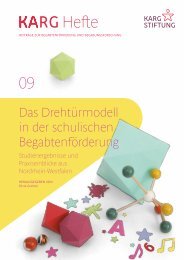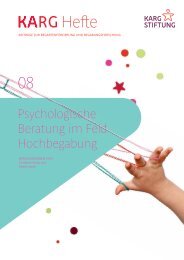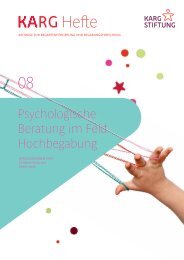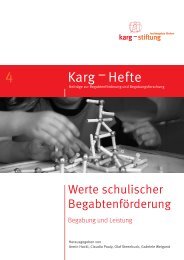FAQS: Frequently asked questions about giftedness
The Karg Foundation receives a lot of questions on the subject of giftedness—FAQs (Frequently Asked Questions)—far more often indeed than it did ten years ago. And this is a good thing! Many people involved in the educational processes of children have come to realize that giftedness can also be a fundamental personality trait of children and adolescents. The Karg Foundation wants to answer the questions you may have not only as educational and psychological professionals in educational institutions or working as educational providers, policy makers, or in training and further education institutes, but as parents and gifted people also: What is giftedness? How can it be identified? Who can provide advise for gifted children and their families? How can they be supported in the best possible way?
The Karg Foundation receives a lot of questions on the subject of giftedness—FAQs (Frequently Asked Questions)—far more often indeed than it did ten years ago. And this is a good thing! Many people involved in the educational processes of children have come to realize that giftedness can also be a fundamental personality trait of children and adolescents.
The Karg Foundation wants to answer the questions you may have not only as educational and psychological professionals in educational institutions or working as educational providers, policy makers, or in training and further education institutes, but as parents and gifted people also: What is giftedness? How can it be identified? Who can provide advise for gifted children and their families? How can they be supported in the best possible way?
You also want an ePaper? Increase the reach of your titles
YUMPU automatically turns print PDFs into web optimized ePapers that Google loves.
What options are available for<br />
providing support to gifted<br />
children and adolescents outside<br />
of school?<br />
such as adult education centers or museums, can also<br />
offer exciting programs for gifted children and teenagers.<br />
For older, particularly gifted students, a school year abroad<br />
can be a challenging and intensely empowering time to<br />
learn a new language and gain new experiences.<br />
Gifted students also find a variety of opportunities<br />
outside of school to pursue their interests, meet likeminded<br />
people, and develop their potentials. Yet the range<br />
of available options varies considerably from region to<br />
region. Several public and private institutions offer afternoon<br />
courses on a wide range of topics. In addition, in<br />
many cities, there are course programs offered for gifted<br />
children that are organized by local parents’ associations.<br />
In addition, student and summer academies (e.g., the<br />
Deutsche SchülerAkademie [German Student Academy]<br />
for upper secondary school students) target gifted, enthusiastic,<br />
and interested young people who enjoy participating<br />
in projects or working intensively on a subject or topic.<br />
Participation in one of the many federal or state student<br />
competitions also offers an attractive option. Most universities<br />
also offer courses for interested and talented pupils,<br />
for example, in the form of university lectures for children<br />
(Kinderuni) or by providing the opportunity for enrollment<br />
in an early study program. Other educational institutions,<br />
90 91
















